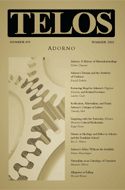Roger Foster’s “Lingering with the Particular: Minima Moralia‘s Critical Modernism” appears in Telos 155 (Summer 2011). Read the full version online at the TELOS Online website, or purchase a print copy of the issue here.
 This essay argues that the ethical claim of Theodor Adorno’s Minima Moralia depends on its being read as an original version of the modernist idea of ethical critique as the aesthetic presentation of individual experience. While contemporary efforts to understand Minima Moralia as a form of substantive critique have merit, they have not fully appreciated the character of this work as a type of ethical performance. The second section of the essay lays out the background of this model of ethical critique in Adorno’s understanding of the system of universal fungibility. Adorno’s ethical performance, I argue, is a way of rescuing the ethical import of particularity. The execution of this idea in Minima Moralia through the rhetorical strategy of exaggeration is then examined in the third section. I then turn, finally, to a discussion of the key conceptual contrast between “lingering” and possessiveness. These terms allow Adorno to theorize injustice as a distortion of particularity, and also provide the model for a form of thinking and comportment that resists that distortion.
This essay argues that the ethical claim of Theodor Adorno’s Minima Moralia depends on its being read as an original version of the modernist idea of ethical critique as the aesthetic presentation of individual experience. While contemporary efforts to understand Minima Moralia as a form of substantive critique have merit, they have not fully appreciated the character of this work as a type of ethical performance. The second section of the essay lays out the background of this model of ethical critique in Adorno’s understanding of the system of universal fungibility. Adorno’s ethical performance, I argue, is a way of rescuing the ethical import of particularity. The execution of this idea in Minima Moralia through the rhetorical strategy of exaggeration is then examined in the third section. I then turn, finally, to a discussion of the key conceptual contrast between “lingering” and possessiveness. These terms allow Adorno to theorize injustice as a distortion of particularity, and also provide the model for a form of thinking and comportment that resists that distortion.


